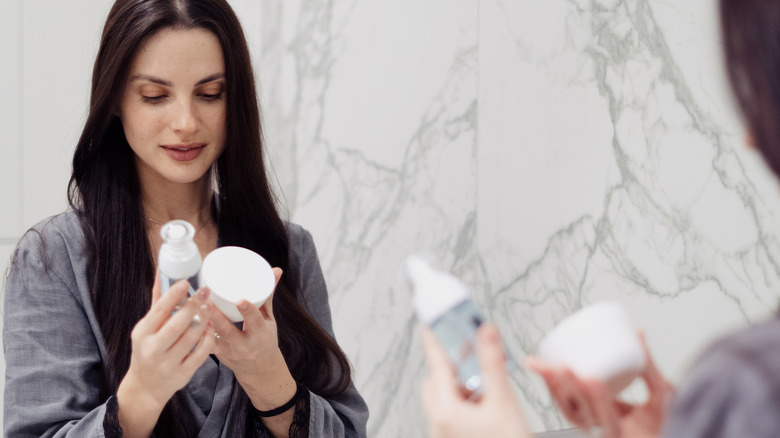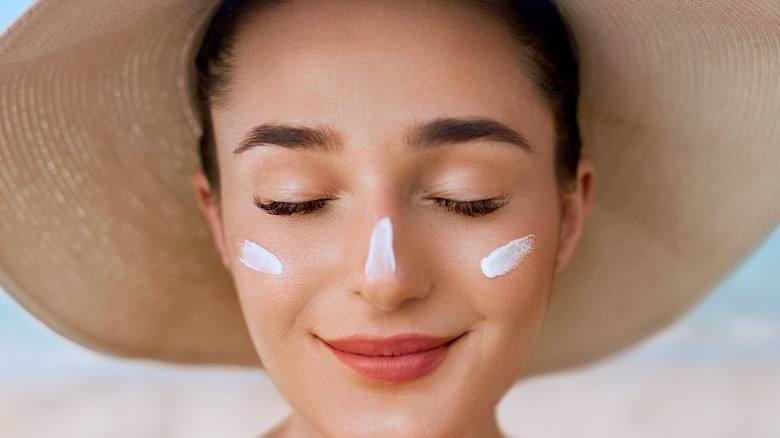10 Myths About Vitamin C You Should Stop Believing
Whether you're a skin care buff or not, we're sure you've all heard about vitamin C. It is highly regarded as the holy grail of skin care routines, thanks to its many benefits. Vitamin C is a nutrient our body requires to form collagen, cartilage, and blood vessels, according to the Mayo Clinic. It's also an antioxidant — meaning that it protects our body from harmful free radicals. Since our bodies don't naturally produce this necessary nutrient, finding ways to incorporate it into our diets is usually recommended, as it has been shown to lower the risk of cancer and boost the immune system, among other benefits.
As a topical treatment, vitamin C, usually in the form of ascorbic acid, has piqued the interest of those looking to improve their skin. With the number of research-based benefits, it provides — like stimulating collagen production, protection against harmful UV rays, brightening hyperpigmentation, and preventing inflammation — who wouldn't want to add this superpowered ingredient to their ever-growing skin care routine?
Due to its popularity, however, one can assume that there are several misconceptions about what this ingredient actually does. If you're one such person, you are justified in your skepticism. Although there are several benefits vitamin C can provide, there are just as many, if not more, myths surrounding the popular antioxidant. To ensure that you don't fall down the vitamin C rabbit hole, here are a few myths about vitamin C you should stop believing.
Myth: Vitamin C should be used at a higher percentage
Reaching for that 10% benzoyl peroxide spot treatment or 2% salicylic acid serum may be tempting at first, but you may start to notice that these higher percentage actives will cause more harm than good. You may have already learned from experience that less is definitely more in the world of skin care. This is true even when using gentler products.
Although active ingredients formulated at a higher percentage can provide faster results, they can also increase the risk of irritation — which will create several issues for the skin you were trying to treat in the first place. Since vitamin C is praised for its hero-like qualities in formulations, many believe that simply higher concentrations of this ingredient will result in healthier skin.
This is a harmful myth to believe because using more vitamin C will cause adverse effects. According to a 2017 study published in The Journal of Clinical and Aesthetic Dermatology, anywhere from 8% to 20% is enough to see adequate results topically. Anything less than 8% won't be enough to make a significant difference, while anything above 20% can lead to skin irritation. That said, the right percentage of vitamin C for one person won't be the same for the next. A good rule of thumb is to start at a low percentage (in this case, 8%) and work your way up as your skin adjusts to the active ingredient.
Myth: Vitamin C doesn't work well with other active ingredients
An assortment of skin care ingredients working together is — at its core — the basis of having a good routine. We need our ingredients to play nice with one another to maximize the benefits. While some ingredients are very picky about who they're paired with (looking at you, retinoids), there are several ingredients that could, and should, be combined to increase general efficacy. This applies to vitamin C.
Since vitamin C is notorious for being unstable in several formulations, many believe this sensitive ingredient can't be combined with other actives. But that's false. According to a study published in the Journal of the American Academy of Dermatology, vitamin C combined with vitamin E and ferulic acid can help not only stabilize the ingredient, but it can also boost its efficacy as well. Since it is an antioxidant, it seems to play nice with sunscreen filters as well — adding some extra coverage for UVA and UVB protection, a study in Acta Dermato-Venereologica demonstrated.
Although you should avoid combining ingredients like benzoyl peroxide or retinol with vitamin C, you can spread them out throughout the day — using one in your morning skin care routine and one in your nighttime routine (via InStyle).
Myth: Vitamin C supplements and serums work exactly the same
Products made for our skin can certainly help us see drastic improvements. However, they're not cure-alls. With external factors like sleep and stress affecting our skin, it may be wise to look at lifestyle choices, like diet, to see how they contribute to your skin's wellness.
Since topical vitamin C can provide great results, some believe that oral vitamin C supplements work in the same way. This isn't the case, though. "While vitamin C is an important nutrient for overall health, little reaches the skin when orally ingested," Dr. Sheldon Pinnell, clinical researcher and the founding scientist of SkinCeuticals explained to HintMD. He continued, saying, "The most effective method for replenishing vitamin C in the skin is therefore to go straight to the source, and apply it directly. In fact, applying vitamin C to the skin is 20 times more effective than oral ingestion."
If you were to increase your oral vitamin C intake to see those same sorts of benefits, you'd risk experiencing uncomfortable side effects, like indigestion, nausea, heartburn, and more (via Mayo Clinic).
Myth: Vitamin C can replace sunscreen
When vitamin C is applied topically, it can provide some benefits to photodamage. A study in The British Journal of Dermatology found a positive correlation between vitamin C (L-ascorbic acid) and sun protection. Due to its UVA and UVB protective abilities, many believe that vitamin C can also work as sunscreen. However, that is a harmful myth.
While vitamin C may offer some sun protection, it cannot replace the need for sunscreen. According to an older study published in Acta Dermato-Venerologica, vitamin C — along with vitamin E — are very capable components of extra sun protection. Given that it's an antioxidant, you'd actually see more benefits by pairing it with sunscreen rather than using it without one. "I usually recommend applying vitamin C serum in the morning under moisturizer and sunscreen, as it can then work to combat exposure to free radicals and ultraviolet light throughout the day," Dr. Steven Mandrea, a board-certified dermatologist, told Real Simple.
A lot of the advantages vitamin C provides can quickly be reversed if you believe that this ingredient is all you need for the harmful rays we're exposed to daily.
Myth: All forms of vitamin C are unstable
You may have heard that vitamin C is unstable, making it difficult to store or use in combination with other products (via Byrdie). However, vitamin C comes in many different shapes and sizes. The most popular and notable form of this superpowered ingredient is ascorbic acid. "It's the most well researched, and effective, form of vitamin C but it is also the most unstable," Dr. Aimee Paik, a board-certified dermatologist, told Apostrophe. "Formulation with this type of vitamin C is notoriously difficult since the ingredient is hard to stabilize." If you've ever heard someone refer to vitamin C as unstable, chances are they mean to say ascorbic acid.
Alternative forms of vitamin C are gentler and more stable — like ascorbyl glucoside and magnesium ascorbyl phosphate. Despite limited research, studies suggest that these ingredients not only drive the same benefits to the skin but are stable in many formulations. Other benefits include gentler penetration to the skin, which can be advantageous for those who found that ascorbic acid is too sensitizing. Other forms of vitamin C include tetrahexyldecyl ascorbate, ascorbyl 6-palmitate, 3-0-ethylated ascorbic acid, and sodium ascorbic acid (via Apostrophe).
Myth: Vitamin C stops working over time
Skin care is a long winding road full of unending pitfalls we must overcome. As any dermatologist will tell you, skin care isn't static. What your skin responded well to as a teenager may not work the same way when you're older. In addition to this, products themselves only make up a part of possible solutions to the skin concerns you may be having. Some believe that the skin can develop a resistance to the active ingredients in skin care — like vitamin C — and suddenly stop working.
While it's true that the skin can develop a tolerance to certain medications, it's quite rare and mainly occurs from topical steroids, Dermatologist Marnie Nussbaum told Marie Claire. If you find your vitamin C serum stops working, it is highly unlikely that your skin has become desensitized or immune to it. Your skin care needs have changed, or the product itself may have degraded and become less effective. According to a study published in BMC Biology, other factors such as diet, environment, and sleep contribute to the health of our skin. Ingredients within our skin care products will always carry the same properties, like being antibacterial or preventing transepidermal water loss.
Don't give up on your vitamin C too early, either. A 2017 study published in Nutrients showed that three months of consistent use greatly improved the appearance of fine lines and wrinkles. Furthermore, it may even aid in warding off long-term sun damage to the skin (via The Journal of Investigative Dermatology).
Myth: Vitamin C helps tan your skin
Vitamin C goes through a process called oxidation. Once it oxidizes, the color of the product that contains it can change from its typical yellowish color to an orange-brown hue. According to dermatologist Zoe Diana Draelos, this process can be measured and observed through peaches (via Dermatology Times). Since peaches are rich in vitamin C, leaving this fruit out for several hours at room temperature will cause it to change colors. Once this occurs, the potency of vitamin C begins to diminish, which can also occur in skin care products formulated with vitamin C.
Its oxidation process is one reason why many believe that vitamin C tans the skin. Applying this ingredient may not appear to leave a tint on our skin at first, but throughout the day, you may notice some discoloration. Rest assured, however, as this will not permanently stain your skin.
It's also understandable that some may be concerned about the brownish hue they witness following their vitamin C application, thinking they may have accidentally tanned their skin while spending time outside. However, research suggests that this antioxidant has sun-protective properties alongside being a tyrosinase inhibitor — a quality that enables this ingredient to prevent and treat hyperpigmentation. Although the myth that vitamin C colors our skin isn't necessarily "untrue," it doesn't tan the skin or cause any damage unless it's an irritating ingredient for you.
Myth: You need to spend a lot of money on vitamin C
With companies pricing their vitamin C serums so high ($160), some may believe that to get a good vitamin C product, you need to spend an enormous amount of money. Since most products containing this highly sought-after ingredient are considered non-drug cosmetics, it can affect how companies price their items. Although brands like SkinCeuticals formulate their serum specifically to stabilize this unstable antioxidant, some consumers may be turned off by the idea of spending $160 for 1 fluid ounce worth of product — especially when you can find other reliable vitamin C serums for a quarter of that price, like Geek & Gorgeous C-Glow ($12).
Sadly, thinking you need to spend a lot of money on vitamin C products (or most skin care products, really) is a common myth. With the rise of celebrities sharing their nighttime routines full of luxurious moisturizers, toners, and cleansers, people believe that they should follow suit. As dermatologist Dr. Fayne Frey told Fox, though, the price tag on an ingredient has nothing to do with its quality.
Even the most expensive products can irritate your skin due to poor formulations. With an ingredient like vitamin C, you don't need to spend top dollar. Since its formula determines its efficacy, you'll be surprised by how many useful vitamin C serums are out there for such a low price.
Myth: Vitamin C should only be used at night
Given its instability in certain formulas and its impending degradation from oxidation, many believe that vitamin C and the sun don't have a good relationship. As such, it's highly regarded as an ingredient that should only be used at night. The ingredient's ability to increase cell turnover — the process our body goes through to replace dead skin cells with healthier ones — may have contributed to the stigma around it, with many thinking that turnover is photosensitivity. And who could blame them? After all, many active ingredients that are known for increasing cell turnover are also known to make us photosensitive (retinol, glycolic acid, et cetera). However, this isn't the case for vitamin C (via Hello Giggles).
As highlighted, vitamin C can actually help to protect the skin from harmful UVA and UVB rays. "Vitamin C ... will not make your skin more vulnerable to sunburn," board-certified dermatopathologist Gretchen Frieling told Hello Giggles. The only reason you would need to stick to using this ingredient at night is if your morning routine includes an ingredient that doesn't play well with vitamin C.
Myth: Vitamin C works for everyone
Given its popularity, it's easy to assume that vitamin C is a non-negotiable part of your skin care routine. It is a highly sought-after ingredient due to its ability to tackle many skin concerns, including hyperpigmentation, premature aging, varying skin texture, sun damage, and more. In turn, this may influence us to go out and grab the best vitamin C product we could find to take advantage of these several benefits. However, some may find that vitamin C irritates their skin.
In fact, dermatologic surgeon Joel Schlessinger told Everyday Health that people with very sensitive skin should speak with a dermatologist before using any vitamin C skin care product due to the potential for irritation. Vitamin C, like many skin care ingredients, needs to work with the user's specific skin type in order for it to be effective.
If you find vitamin C isn't for you, several other skin care ingredients may. Licorice root, for example, exhibits similar antioxidant properties and wards off hyperpigmentation, inflammation, and aging within the skin, a study in Antioxidants found. According to a study published in the American Society for Dermatologic Surgery, niacinamide, a B vitamin, carries similar benefits as well.










